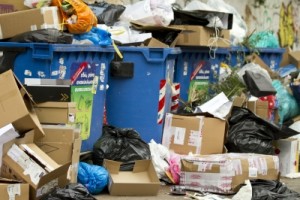 The controversial waste shipment from Canada, “although illegal, is non-toxic, non-hazardous, and is being disposed in a manner consistent with applicable environment regulations,” the Bureau of Customs (BOC) said in a statement.
The controversial waste shipment from Canada, “although illegal, is non-toxic, non-hazardous, and is being disposed in a manner consistent with applicable environment regulations,” the Bureau of Customs (BOC) said in a statement.
BOC called an inter-agency meeting attended by representatives from the Department of Natural Resources (DENR), Department of Justice (DOJ), Department of Foreign Affairs (DFA) on July 22 to resolve the disposal of non-toxic municipal waste from Canada consigned to Chronic Plastic/ Chronic Inc. and Live Green Enterprises.
The shipment of domestic waste was misdeclared as scrap plastics, a regulated importable raw material, when it arrived at the Manila International Container Port (MICP). As a result, charges were filed against Chronic Plastics owner Adelfa Eduardo and the company’s licensed customs brokers Leonora Flores and Sherjun Saldon for violation of Sections 3601 and 3602 of the Tariff and Customs Code of the Philippines (TCCP); Republic Act (RA) 6969; and Article 172 in relation to Article 171 of the Revised Penal Code of the Philippines.
Out of all 55 containers shipped to the Philippines, 26 had already been disposed of at the Metro Clark Waste Management Corp in Sitio Kalangitan in Capas, Tarlac. Five containers remain at the MICP container yard; 16 are in the Port of Subic; and eight still in Tarlac due to opposition from the Sangguniang Panlalawigan of Tarlac.
In a letter to the Provincial Government of Tarlac, Customs Commissioner Alberto Lina said the bureau is merely implementing a court order requiring the release of the container vans “to properly dispose the content in a manner appropriate to its nature.”
He explained, “The Metro Clark Waste Management Corporation, having the capacity and expertise to dispose of the said non-hazardous Municipal Waste, is tasked to dispose of the same in accordance with existing laws, rules and regulations.
“The Bureau of Customs is with the Tarlac governor’s advocacy to prohibit the dumping of wastes which are inimical and adverse to the environment. However, these wastes are non-hazardous which are neither inimical and adverse to the environment nor detrimental to the health of their constituents.”
The customs chief asked the Tarlac local government (LGU) unit to reconsider its decision and to allow the dumping within their territorial jurisdiction.
Lina noted that contrary to reports, the Tarlac LGU has been informed and represented in the multipartite monitoring team since the start of the waste disposal in Capas.
According to a Waste Analysis and Characterization Study (WACS) made by the DENR, the container vans generally contain baled municipal solid wastes or garbage that contain residuals that cannot or can no longer be recycled and as such destined for disposal. Specifically, it consisted of food containers, petroleum product containers, detergent packaging and newspapers.
During the meeting, the inter-agency committee said it will continue to explore other actions it may take against the exporter pursuant to the Basel Convention. It has been raised that civil or criminal cases will be filed against Chronic Plastic and Live Green Enterprises, whose Customs accreditation shall also be cancelled.
The Philippine government, through the DFA/DOJ will also send a request to the Canadian government to hold legally liable the personalities involved in the illegal movement of these prohibited shipments.
Initially, the inter-agency group composed of DFA, DOJ, DOH, BOC, Association of International Shipping Lines, International Container Terminal Services Inc (operator of Manila and Subic ports), and headed by DENR maintained that the shipments be exported back to Canada, BOC said.
Canada said it views the importation as a commercial transaction, but will remain committed to continue working with the Philippine government to resolve the issue.
Image courtesy of the photoholic at FreeDigitalPhotos.net





